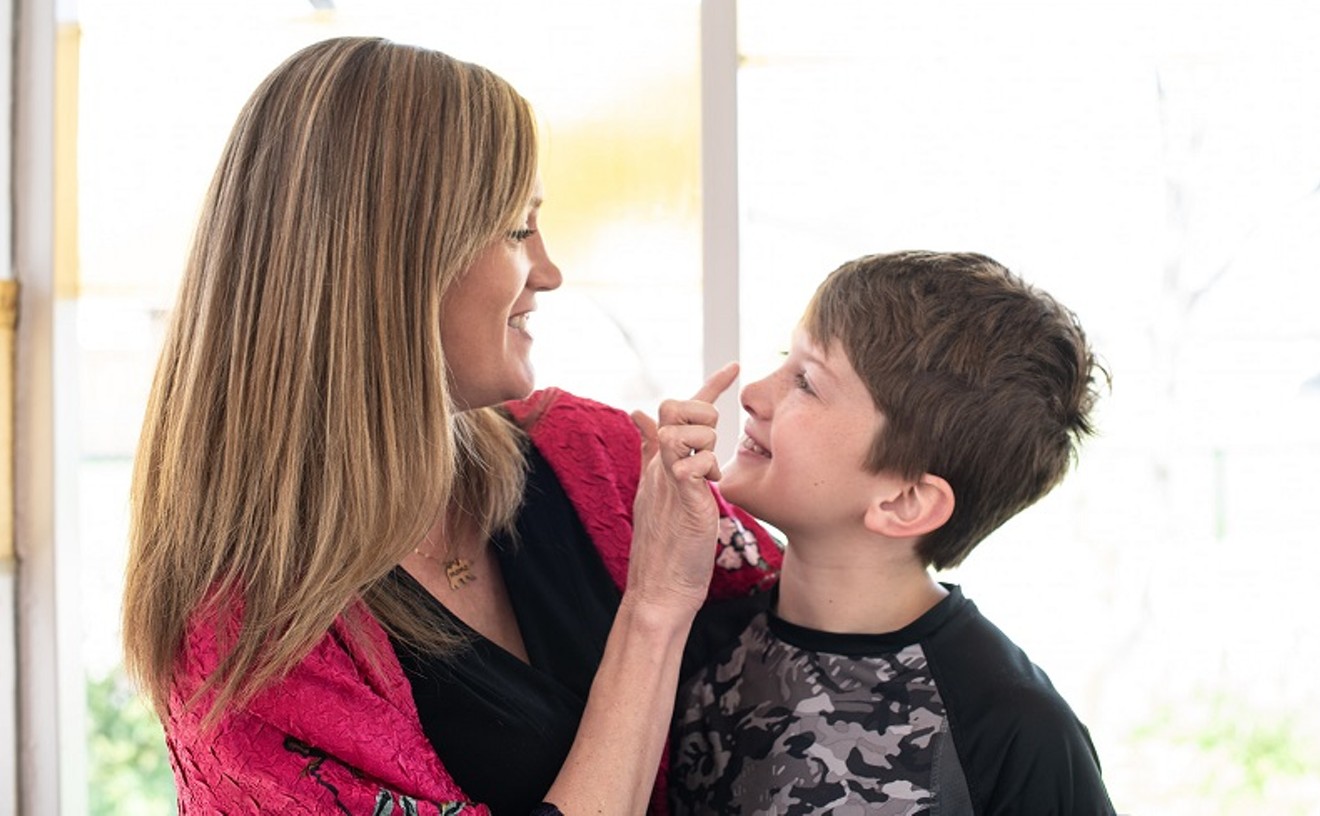Careless set design and poor casting are the most vile culprits in Something Unspoken and Tough Choices for the New Century. Are we to believe a rich Southern woman in Tennessee Williams' Unspoken couldn't manage to find a dining set with matching pieces? And a pretty, feminine gun-rights fanatic would be hilarious in Tough Choices if the actress had any concept of the absurd. In contrast to those sloppy efforts, something as simple as a well-tended soundtrack to Sunny and Eddie Sitting in a Tree is an example of what happens when someone sweats the little things: The audience stops observing the characters and starts feeling for them. In a tiny black-box theater like the one at the Bath House, the fourth wall is a delicate one. In this sampling of three FIT plays, it is not always treated respectfully.
Something Unspoken was first produced in 1958 along with Williams' better-known Suddenly Last Summer as a pair of one-acts. In the years since, Summer has taken on a life and following of its own, fascinating audiences with its gruesome imagery--cannibalism and lobotomies, anyone?--leaving the rarely produced Something Unspoken in its wake. But underperformed plays by great playwrights aren't put out to pasture for nothing. Unspoken's difficult subtext and sparse story make it a challenging piece to produce effectively.
The plot is about the well-to-do, conniving, middle-aged Cornelia Scott and her bid for the position of regent in a New Orleans chapter of the Confederate Daughters. Scott, portrayed by a dignified Midge Verhein, manages her campaign from a phone in her breakfast room rather than attending the vote herself. The only other onstage character is Scott's high-strung younger secretary, Grace Lancaster, played like a deer in the headlights by Moira Wilson. Nearly all of the 45-minute play's dialogue is spoken across Scott's breakfast table, a piece of furniture that would, in a stronger production, become a character unto itself as it bears the burden of 15 years of sexual tension between Cornelia and her secretary. The "something unspoken" is simply this: The women are, and have always been, in love with one another.
The entire play, however, revolves around that stately cherrywood kitchen table that hardly matches two dark, unpolished wooden chairs used by Cornelia and Grace. Was there no matching dining set to be had in all of Cornelia Scott's rich New Orleans--or in all of artistic director Susan Sargeant's Dallas? A proud Confederate Daughter such as Scott wouldn't be caught dead with mismatched table and chairs. Unspoken relies heavily on subtext; the women of Something Unspoken are deep, troubled characters who must be developed through more than dialogue. Overlooking something as character-defining as the table across which Ms. Scott attempts to profess undying love is inexcusably shoddy set design.
The clashing furniture distracts from the emotional tension between the rigid Grace and passionate Cornelia. They're left with an empty space unbridged by formulaic almost hand pats and stolen glances. At the end of the play you're left wondering, "So, they're supposed to be lesbians, right?"
Initially less painful but ultimately more stagnant is Tough Choices for the New Century, a faux safety seminar written by Emmy-nominated New York comic Jane Anderson. The material is plentiful--a bickering, overstressed husband and wife attempt to lead a lecture on "preparedness" after suffering every possible act of God, from hurricane to forest fire. Clad in matching "TOUGH CHOICES" tees and khakis, Bob and Helen Dooley (played by spot-on Ray Gestaut and an exhausting Kelly Thomas) encourage the audience to ditch their keepsakes--begrudgingly on Helen's part, as she did love those Hummel figurines that got lost in the 'quake--and live in a state of constant vigilance.
In Tough Choices, details such as a horrendously designed PowerPoint presentation and overused laser pointer create a pleasant, Spinal Tap-esque atmosphere during the first half of the play. But when the third presenter, militant femme Arden Shingles, played by the too-slight, too-pretty Aleisha Force, is introduced, the laughs decrease exponentially. It's not the script, it's the casting.
Shingles, a businesswoman turned way-overzealous gun enthusiast after she was kidnapped and forced to shoot and kill her assailant, requires a more intense degree of crazy than Force musters. She just doesn't grasp that her character is completely out of control, even when she pulls out a loaded 9 mm during her lecture. Yet even if she were to lend a wilder eye to the performance, Force still lacks the physical edge for the role. The show makes a vain attempt at recovery in the last few minutes, with Bob Dooley stepping in for some much-needed comic relief and, hooray, gunplay! But it's not enough to erase a languishing second half.
There is at least one clear winner among the eight plays in FIT rotation: Sunny and Eddie Sitting in a Tree, an inspiring romantic comedy by local playwright Matt Lyle that's performed by the thoroughly funny Bootstraps Comedy Theater company. The premise, two people falling in love at their therapist's office, has the potential to become trite but escapes that fate through painfully human dialogue, stories too embarrassing to be taken from anything but real life and a genuine appreciation for silliness that's refreshing.
Taking obvious but carefully controlled cues from Woody Allen and Cameron Crowe, Sunny and Eddie feels as much like a film as a play. It's got all the overt physical outrageousness of live theater--the clown bit is particularly entertaining, and the part with the 8-foot Cyclops just wouldn't be nearly as funny on the screen--but nervous eye movement, lip-biting and finger-drumming say just as much at key moments.
Kim Lyle's Sunny starts out thoroughly overacted with only a damn funny script to make her endearing, but she finds her groove near the middle of the play and becomes much more likable. The neurotic Eddie, immediately enamored of Sunny, is lovingly played by the show's writer, Matt Lyle. The small supporting cast, given roles ranging from Bible-beating online daters to gay dads, provide just the right amount of texture.
The most remarkable aspect of Sunny and Eddie, however, is the recognition of how powerful the right music can be at the right time. Every scene change is punctuated by the soundtrack of Sunny and Eddie's twentysomething generation. Audience members actually started singing along with the Polyphonic Spree, and no song could better capture Sunny and Eddie's awkward offstage love scene than Bright Eyes' "Take It Easy (Love Nothing)." Where other FIT plays forget their audience, Sunny and Eddie knows them intimately, and the details are filled in effortlessly. The whole thing comes off feeling--gasp--practically professional.
A note to FIT plays' producers and directors: Treat the devil and his details right, and you'll be rewarded. Treat the devil wrong, and you'll end up with that most undesirable of outcomes: local theater that looks, feels and sounds like local theater.










